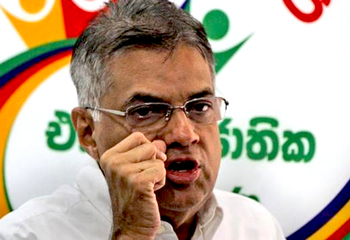Colombo, Mar 7: Sri Lanka Prime Minister Ranil Wickramasinghe has justified Lankan Navy's actions against Indian fishermen saying that that the law creates provisions for a man to 'shoot' an intruder in his home.
 In an interview to Thanthi TV, a Chennai based news channel, Wickremasinghe said his government was willing to make a 'reasonable deal' with India with respect to the fishing rights.
In an interview to Thanthi TV, a Chennai based news channel, Wickremasinghe said his government was willing to make a 'reasonable deal' with India with respect to the fishing rights.
"If someone tries to break into my house, I can shoot. If he gets killed...Law allows me to do that... On the fishermen issue, As far as I'm concerned, I have very very strong lines. These are our waters...Fishermen of Jaffna should be allowed to fish. We stopped them from fishing, which is why the Indian fishermen came in. They are willing to have a deal...Let's have a reasonable deal... But not at the expense of the income of the Northern Fishermen," the Sri Lankan PM said.
Wickremasinghe further said that the issue was between the fishermen of both nations and thus had to be worked out between the two parties. He, however, was adamant that Indian fishermen could not be allowed to trawl.
"It's an issue between Tamil Nadu fishermen and Sri Lankan fishermen... They have got to sit down and we have to work this out. There can be no bottom trawling. There can be no solution that permits the Indian fishermen to do bottom trawling. These are basically Sri Lanka waters... What would you have done if all our fishermen went into the Indian waters and started fishing there...? Now what you are claiming is, we want to come there, we want to fish in your water and we want to bottom trawl in your waters," he said.
The Sri Lankan Prime Minister further conceded that have been instances of the Sti Lankan Navy shooting innocent fishermen, but denied that it was a violation of human rights.
"At that time, LTTE was running arms... Whether Sri Lankan Fishermen or Indian fishermen, they had to stop, when the Navy asks them to stop. There also have been instances of the Sri Lankan Navy shooting innocent fishermen. We have not said no to it. In some instance they have to shoot because they were poaching on Sri Lankan Waters. Why are you coming into our waters? Why are you fishing in our waters...? Stay on the Indian side... There will be no issue...No one will shoot anyone else...You stay on the Indian side, Let our fishermen stay on the Sri Lankan side... Otherwise don't make accusations of Human rights violation by the Navy. You came in there," he said.
"You be on to that side, we be on that side. Why do you all pick up the Italian sailors...? You say you are friendly with Italy, show that same magnanimity to Italy that you want us to show. If you want us to show that magnanimity to your fishermen, India should show the same magnanimity to Italian sailors," he added.
Wickremasinghe's statements comes at a time when External Affairs Minister Sushma Swaraj is visiting the neighbouring country to strengthen the relations between the two countries.
Swaraj on Friday called on Sri Lankan President Maithripala Sirisena on the first day of her trip to set the stage for Prime Minister Narendra Modi's visit to the country, the first bilateral tour by an Indian premier in over 25 years.
PM Modi's visit from March 13-14 will be the first bilateral trip by an Indian prime minister since Rajiv Gandhi visited the island in 1987 to sign the Indo-Lanka Accord.
PM Modi will be the first Indian prime minister to travel to war-ravaged Jaffna in Tamil-dominated Northern Province and Trincomalee in the Eastern Province.
India-Sri Lanka relations had seen tensions during last few years of the rule of former president Mahinda Rajapaksa, who was voted out of power, as China had expanded its footprint in the country by building ports, highways and participating in other infrastructure projects.






Comments
Add new comment